


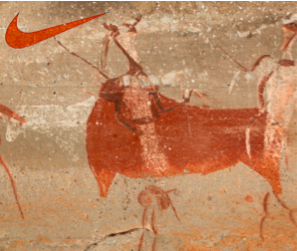
Paleolithic-era Branded Content
(Post by Rex Hammock)
When I first started blogging 13 years ago, I thought I’d attempt to correct the misperception that there’s something new about companies creating informative, high-quality and helpful media for customers. Back then, the conventional wisdom among media and marketing reporters (and most marketers) was that companies communicate with customers by purchasing advertising in media that other companies own, not via media they own.
But I knew the truth: Media created by companies for their customers has been around since Fred Flintstone invented it.

After a radical overhaul, the corporate website of Coca-Cola (Coca-ColaCompany.com) now demonstrates how story-focused customer media and engaging content isn’t just for product marketers anymore.
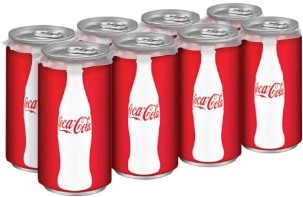 Hammock’s current Idea Email focuses on the approach the Coca-Cola Company has taken to radically pivot away from what most companies do with their corporate websites. Traditionally considered little more than a brochure website and repository for press releases and administrative content, Coke has transformed the site into an ever-changing and engaging “publishing model” site called Journey.
Hammock’s current Idea Email focuses on the approach the Coca-Cola Company has taken to radically pivot away from what most companies do with their corporate websites. Traditionally considered little more than a brochure website and repository for press releases and administrative content, Coke has transformed the site into an ever-changing and engaging “publishing model” site called Journey.
Here are some of the lessons learned from the first six months of the new approach, according to Coca-Cola executives, including Ashley Callahan, Coca-Cola manager of digital and social media communications, who made a presentation about Journey at last week’s Custom Content Council Conference. We also added some observations from our analysis of the site.
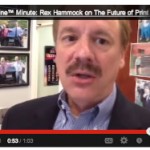 While Rex Hammock was in Oxford, Mississipi earlier this week (see previous post), Mr. Magazine Samir Husni interviewed Rex and posted a couple of “Mr. Magazine Minutes”–Rex’s answers to a couple of questions.
While Rex Hammock was in Oxford, Mississipi earlier this week (see previous post), Mr. Magazine Samir Husni interviewed Rex and posted a couple of “Mr. Magazine Minutes”–Rex’s answers to a couple of questions.
On his blog, Professor Husni wrote:
“You can call Rex Hammock, the founder and chief executive officer of the Nashville-based Hammock Inc., any name you want, except that of a Luddite. Rex bought his first Apple Mac in 1984, and has been tempted by the Apple ever since. On Twitter he is simply known as @R. He is all over the web, the digital sphere and more.
So when Rex came to speak to my magazine students at the Meek School of Journalism and New Media yesterday, I seized the opportunity to ask him two questions, after he completed his presentation to the students.
Here are Rex’s two Mr. Magazine minute videos. (If you are on the front of the Hammock Blog, click through to see the videos)
[Post by Rex Hammock]
Because Hammock has a long history of publishing print magazines while, simultaneously, serving as creators of digital media delivered to audiences via screens (starting back in the days of CompuServe and laserdiscs), I’m often asked about the future of print magazines – as in: Will print magazines still be around in the future?
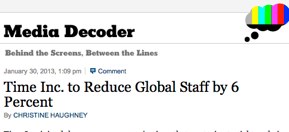
Time is ticking away.
These questions typically spike whenever there is news involving closures or layoffs at once-powerful magazines like Time or Newsweek. or when a famous person like a Facebook co-founder sparks a lot of media coverage for buying a magazine like The New Republic.
Here’s my quick answer to the question, “Will print magazines be around in the future?”:
“Yes, but…”
For a much longer version of this answer – a version with predictions covering all types of print magazines – read on…
[Cross-posted on Rex Hammock’s RexBlog.com]
A few seconds after I saw the Super Bowl power outage “Oreo tweet” last night, I was so awed, I responded with the tweet below (Note: the time-stamp is GMT.) Scroll down, and you’ll find my Monday morning thoughts about what made it such a breakthrough use of social media.
What Apple 1984 is to TV ads, this is to use of Twitter @oreo: Power out? No problem. twitter.com/Oreo/status/29…”
— Rex Hammock (@R) February 4, 2013
Monday morning, 5:30 a.m.:
I’m not a fan of long explanations of the self-evident, but I know there will be much misinterpretation of why the Oreo tweet was brilliant, so I wanted to weigh in before the media sites that write headlines for Google (Huffington Post) start their SEO avalanche of headlines like “10 lessons you can learn from the Oreo tweet.”
Here are my two takeaways of why the Oreo tweet is the most outstanding use of use of Twitter as a unique marketing medium and distribution channel. (Note: There are countless ways to use Twitter, and far more important ways than mere marketing.)
 [A version of this post was cross-posted on RexBlog]
[A version of this post was cross-posted on RexBlog]
Yesterday, Wikipedia added the “ePUB” file format as an export option for collections of Wikipedia articles you want to compile. This may not sound like something new, as the ability to compile — and even order a print-on-demand version of — such a collection of articles has been around for a while.
What makes this new feature significant is that ePUB is a format optimized for display using all the major ebook reader devices or apps (Kindle, Apple iBooks, Google Books, Nook, etc.). While PDFs of such articles were readable on such devices or apps, the ePUB format will provide you with a document that is more book-like.
 [By Rex Hammock, cross-posted on RexBlog.com]
[By Rex Hammock, cross-posted on RexBlog.com]
A comment by Facebook CEO Mark Zuckerberg yesterday is being given a lot of coverage by tech media and the financial press. However, outside a specific context that Facebook faces, the quote could be confusing to non-tech business decision makers — especially when interpreted to be true in all cases, and not specifically in Facebook’s situation.
Here’s the quote: “The biggest mistake we made as a company was betting too much on HTML5 instead of native … We burnt two years.”
While it is easy to think of many Facebook mistakes far worse (that whole IPO fiasco, for instance), the point of this post is not to debate his quote. The point of this post is to encourage businesses that may have a perfectly wonderful reason for using HTML5 to avoid associating it with the phrase, “biggest mistake.”
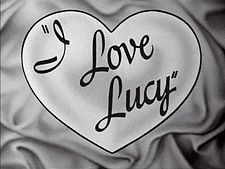 Over the weekend, the smart and successful VC Fred Wilson used the metaphor of TV shows vs. TV networks to suggest that investors (and the rest of us) sometimes (often?) confuse the significance of various kinds of web-based startups.
Over the weekend, the smart and successful VC Fred Wilson used the metaphor of TV shows vs. TV networks to suggest that investors (and the rest of us) sometimes (often?) confuse the significance of various kinds of web-based startups.
Anyone who has used the Internet for more than five years should immediately recognize what he’s suggesting. Some things we believe will define the future — things that are so disruptive they will do away with institutions that have been in place for centuries — turn out to be “I Love Lucy” or MySpace.
If I were to debate this topic (and I’m not), my position would be this: In this metaphor TV is “the Internet.” Everything else is a TV show.